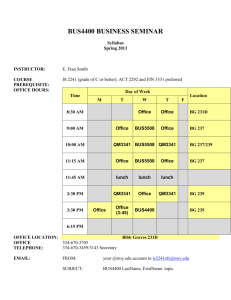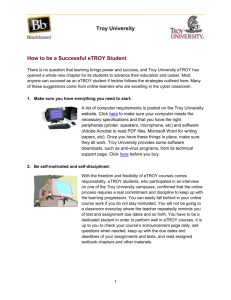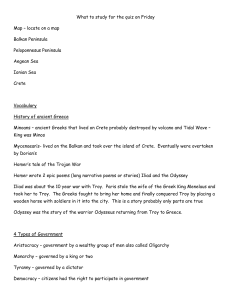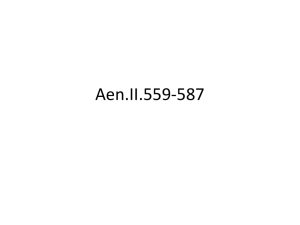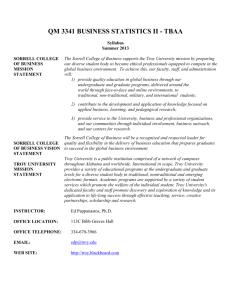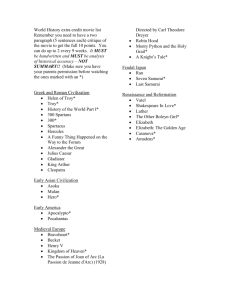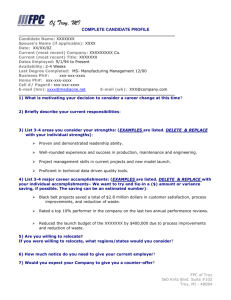QM 2241 BUSINESS STATISTICS - the Sorrell College of Business
advertisement
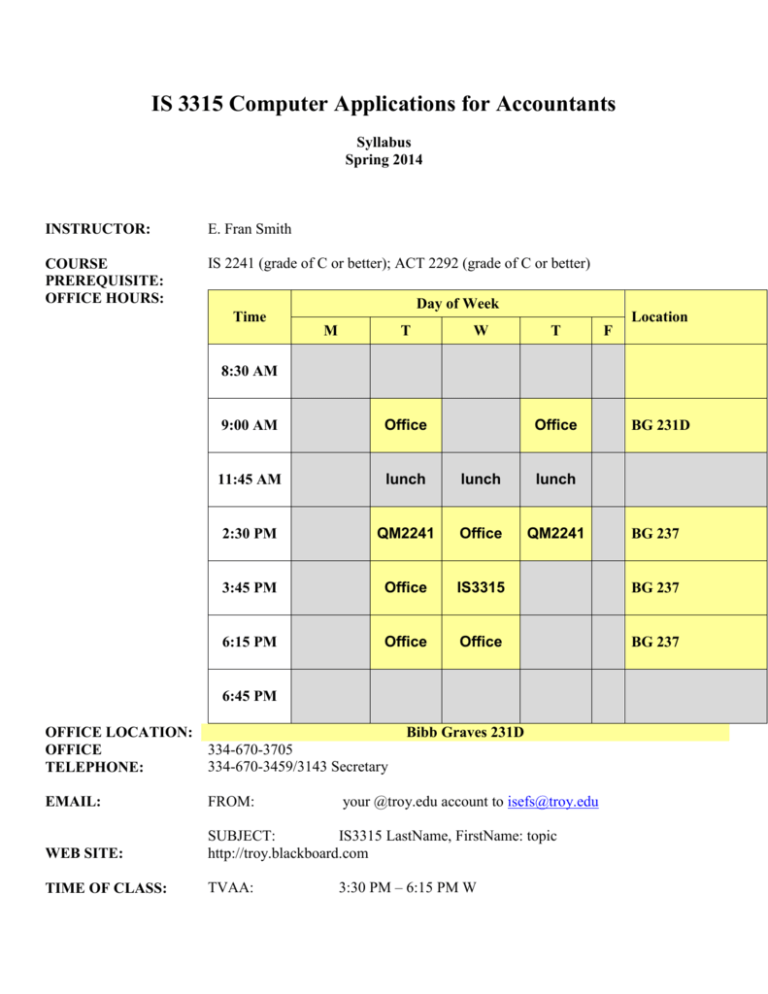
IS 3315 Computer Applications for Accountants Syllabus Spring 2014 INSTRUCTOR: E. Fran Smith COURSE PREREQUISITE: OFFICE HOURS: IS 2241 (grade of C or better); ACT 2292 (grade of C or better) Day of Week Time Location M T W T F 8:30 AM 9:00 AM Office Office 11:45 AM lunch lunch lunch 2:30 PM QM2241 Office QM2241 3:45 PM Office IS3315 BG 237 6:15 PM Office Office BG 237 6:45 PM OFFICE LOCATION: 334-670-3705 OFFICE 334-670-3459/3143 Secretary TELEPHONE: Bibb Graves 231D EMAIL: FROM: your @troy.edu account to isefs@troy.edu WEB SITE: SUBJECT: IS3315 LastName, FirstName: topic http://troy.blackboard.com TIME OF CLASS: TVAA: 3:30 PM – 6:15 PM W BG 231D BG 237 CLASS LOCATION: BG237 COURSE DESCRIPTION: A computer applications course in which accounting majors use common business word processing, presentation, application, and spreadsheet software to design and implement solutions to common accounting problems and issues. Chapter COURSE OBJECTIVES: FM OFF EXCEL 1 2 3 4 5 REVIEW 1 General Information General File Management in Windows 7 Common Elements in Office 2007/2010 Word PowerPoint REVIEW 2 EXCEL Level 1 EXCEL CHAPTER 1 Spreadsheet basics Navigation Enter text, values, dates, formulas and functions Inserting/adjusting/deleting rows and columns Inserting/deleting/moving/copying cells Moving/copying formulas Inserting/deleting/renaming/moving/copying worksheets Editing/Find and Replace/Spell Check Printing Formatting basics EXCEL CHAPTER 2 Workbooks (files)/worksheets Text Values/dates/times Cell alignment/indentation/merge/text rotation/borders Styles/table styles Themes Conditional formatting Printing More on formulas/functions Cell addressing Function syntax/inserting functions/typing functions Autofill Logical functions IF Date functions various Financial functions PMT Charts and Graphs EXAM I REVIEW 3 Large Spreadsheets Freezing rows and columns Excel Tables Create/maintain/sort/filter Totals/subtotals NEW 1 5 6 7 8 PivotTables/PivotCharts Managing Multiple Worksheets and Workbooks 3-D Formulas Grouping worksheets and printing worksheet groups Linking workbooks (files) Creating Hyperlinks Creating Templates Saving as a Web Page Advanced functions, Conditional Formatting and Filtering Logical IF and nested IF LOOKUP AND and OR IFERROR COUNTIF(S) SUMIF(S) AVERAGEIF(S) ISBLANK More on conditional formatting More on filtering and database functions Excel Application Data validation Protecting worksheets and workbooks Range Names Macros EXAM II 9 10 NEW 2 PMT/FV/NPER/RATE/Amortization Trends Depreciation NPV/IRR What-IF Analysis Break-Even Goal Seek Data Tables Scenarios 11 Solver Connecting to External Data/Databases and Queries NEW 3 APP:B,C,E Creating a Shared Workbook Certification Skills Advanced Filters, Database, and Summary IFS Functions 12 Visual Basic Applications FINAL EXAM SORRELL COLLEGE OF BUSINESS MISSION STATEMENT The Sorrell College of Business supports the Troy University mission by preparing our diverse student body to become ethical professionals equipped to compete in the global business environment. To achieve this, our faculty, staff, and administration will: 1) provide quality education in global business through our undergraduate and graduate programs, delivered around the world through face-to-face and online environments, to traditional, nontraditional, military, and international students; 2) contribute to the development and application of knowledge focused on applied business, learning, and pedagogical research; 3) provide service to the University, business and professional organizations, and our communities through individual involvement, business outreach, and our centers for research. SORRELL COLLEGE OF BUSINESS VISION STATEMENT The Sorrell College of Business will be a recognized and respected leader for quality and flexibility in the delivery of business education that prepares graduates to succeed in the global business environment. TROY UNIVERSITY MISSION STATEMENT Troy University is a public institution comprised of a network of campuses throughout Alabama and worldwide. International in scope, Troy University provides a variety of educational programs at the undergraduate and graduate levels for a diverse student body in traditional, nontraditional and emerging electronic formats. Academic programs are supported by a variety of student services which promote the welfare of the individual student. Troy University's dedicated faculty and staff promote discovery and exploration of knowledge and its application to lifelong success through effective teaching, service, creative partnerships, scholarship and research. PURPOSE: To develop advanced spreadsheeting, word processing and presentation skills appropriate for entry-level employment in Accounting, Finance and other business TEXTBOOK: fields. New Perspectives on Microsoft® Excel 2010 Comprehensive, Parsons, Oja, Angeloff, and Carey, Course Technology, Cengage Learning (2011). SAM 2010 Access Code (bundled with textbook). OTHER MATERIALS: CLASS PROCEDURE AND REQUIREMENTS: GRADING METHODS & EXAMINATIONS: OPTIONAL: New Perspectives on Microsoft® Word 2010 Comprehensive, Zimmerman, Zimmerman, Shaffer, and Pinard, Course Technology, Cengage Learning (2011). New Perspectives on Microsoft® PowerPoint 2010 Comprehensive, Zimmerman, Zimmerman, and Pinard, Course Technology, Cengage Learning (2011). Class material will be delivered in a lecture/discussion/demonstration format in a computer lab setting. Telephones and beepers must be turned off prior to entering the classroom. There will be 4 exams including the final exam. In addition to the in-class exams, students will have to complete homework assignments and projects. SAMProjects and training completed using the web-based software program, SAM 2010 and Microsoft Office 2010 can be submitted for grading multiple times, and I will keep the highest score. Projects assigned and submitted via Blackboard can be submitted multiple times, but only the last submission will be graded. Since some students do not have online access at home and must use our lab facilities, failure of your home equipment/ISP will not be considered an excuse for late assignments. Final grades will be calculated as a weighted average as follows: Homework and quizzes: 15% Project 10% Exam 1 – REVIEW Chapters 1-4 20% Exam 2 – Chapters 5-8 25% Final Exam – Chapters 9-11 20% Appendices Certification Exam (Excel Expert Level) 10% date and time of exam to be determined Assessment Projects (MANDATORY) bonus TBD The student's final grade will be determined using the traditional grading scale (A: 90-100, B: 80-89, C: 70-79, D: 60-69, F: Below 60). No tests will be dropped, no exams will be given less emphasis and no additional work will be given to boost final grades. All grades will be earned -- NOT given. If you need a particular grade in this class to graduate, keep a scholarship, be eligible for sports, etc..., then you will need to score high enough to earn the grade. Again, students should plan for computer failure by completing Connect work ahead of schedule. ATTENDANCE & STUDENT RESPONSIBILITIES: Attendance will be taken at the beginning of the term for reporting to Financial Aid. Students are expected to: 1. Punctually attend all scheduled classes. 2. Be responsible for all instructions and assignments given in class as well as for the supporting textbook content. 3. Read the textbook material before the lecture covering that material and attempt the suggested problems before the material is covered in class. This leads to a better understanding of the lecture (or lab) as well as the opportunity to ask questions about material(s) in the text that was unclear or that the student did not understand. 4. You are expected to be an active participant in this class. DAILY ASSIGNMENTS: INCOMPLETE/MISS ED WORK POLICY: GENERAL SUPPORTS: CHEATING POLICY: ADDITIONAL SERVICES Any student with a valid excuse for a missed exam will be allowed to make up the exam at some date and time convenient to the instructor. The labs in Bibb Graves are available for student use when other classes are not in session. You can complete the SAM2010 homework from any location with reasonable internet connection. It is expected that students will abide by the Honor Code, Academic Code, Technology Use Policy, and Standards of Conduct as outlined in the most current version of the Oracle, the student handbook. Any student not abiding by these codes/policies/standards will be subject to the penalties outlined in the Oracle. AMERICANS WITH DISABILITIES ACT: Troy University supports Section 504 of the Rehabilitation Act of 1973 and the Americans with Disabilities Act of 1990, which insure that postsecondary students with disabilities have equal access to all academic programs, physical access to all buildings, facilities and events, and are not discriminated against on the basis of disability. Eligible students, with appropriate documentation, will be provided equal opportunity to demonstrate their academic skills and potential through the provision of academic adaptations and reasonable accommodations. Further information, including appropriate contact information, can be found at the link for Troy University’s Office of Human Resources at http://www.troy.edu/humanresources/ADAPolicy2003.htm COURSE OUTLINE AND DATES TO REMEMBER: Class Begins Last Day to Add a Course; Last day to Drop/Withdraw w/o Financial Penalty Wednesday, January 8th Monday, January 13th Holiday – Martin Luther King, Jr., Day Holiday – Spring Break Last Day to Drop/Withdraw w/o Academic Penalty Class Cancelled for “Meet the Firms Day” Final Exam: ELECTRONIC DEVICES POLICY Monday, January 20th M-Su March 10th – 16th Monday, March 17th Wednesday, April 23rd 11-1 Thursday, May 1st Per TROY Academic Operating Policy 8-1-07-08 (See http://www.troy.edu/academics/aop/documents/AOP_08-01-07-08.pdf) Use of any electronic devise by students in the instructional environment is prohibited unless explicitly approved on a case-by-case basis by the instructor of record or by the Office of Disability Services in collaboration with the instructor. Cellular phones, pagers, and other communication devices may be used for emergencies, however, but sending or receiving non-emergency messages is forbidden by the University. Particularly, use of a communication device to violate the Troy University “Standards of Conduct” will result in appropriate disciplinary action (See pp. 42-52 of the Oracle. In order to receive emergency messages from the University or family members, the call receipt indicator of devices must be in the vibration mode or other unobtrusive mode of indication. Students receiving calls that they believe to be emergency calls must answer quietly without disturbing the teaching environment. If the call is an emergency, they must move unobtrusively and quietly from the instructional area and notify the instructor as soon as reasonably possible. Students who are expecting an emergency call should inform the instructor before the start of the instructional period.
